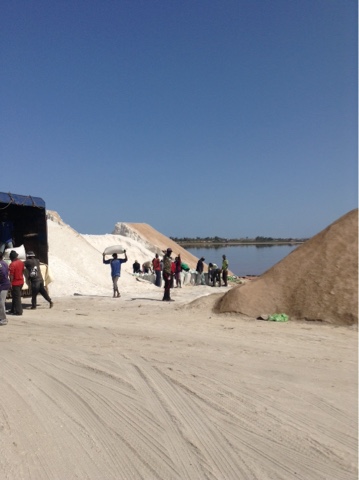Both books cover seven years of travel all over the globe, Nasr's in the 1980s and Stamboulis' in the 1990s. Nasr is of Palestinian heritage and Stamboulis Greek. They grew up in the United States and are American through and through, but they are both clearly men of the world, comfortable in any culture. Their books follow a chronological format, but they are less diary and more lenghty journal entries on meaningful incidents and encounters sometimes months apart. As well-seasoned touring cyclists, they fully capture the many satisfactions of traveling by bike and how it opens the doors to much hospitality and goodwill.
They were both in their thirties when they undertook their travels. The names they chose for their bikes reflect their differing personalities and styles. Nasr, the more reflective and meditative, called his Angel, while Stamboulis, who brought more of a conquest mentality to his biking, called his Odysseus, and occasionally refers to it as his steed. Nasr is the humble sort, letting his achievements speak for themselves, while Stamboulis lapses into the boastful, writing that he is often told "how brave, courageous, great and amazing" he is, which he doesn’t dispute nor put into perspective as a commonn perception applied to any touring cyclist. Some of his finest moments are of others "listening wide-eyed to my tales."
They both brought a strong curious nature to their travels and sought out encounters with others. Stamboulis began his travels in Japan, where he lingered to teach English. He found himself a Japanese wife who accompanied him the first two years, until they separated as their friction increased to the breaking point. He doesn't write much about her until their breakup. And even that merits just a couple of paragraphs. It is the dawn of the Internet era, so they could stay in touch, but he barely mentions her again and they never reunite. He seems to be happiest when he meets fellow travelers who he can trade stories with and impress. When he lingers on Crete and does some more teaching, he is disappointed when he drops mentions of bicycling in the Himalayas and no one expresses interest.
Stamboulis concentrated his travels in Asia. He dips down to New Zealand and Australia, but returns to Asia for another prolonged spell before concluding with a ride across Europe and the US. Nasr makes it to South America and Africa and all five continents. Just as was my experience, Colombia was one of his favorite places, though he makes the common mistake of repeatedly spelling it Columbia with a "u." Stamboulis committed another common faux pas, referring to koalas as "bears." Neither though commit the third of confusing peddling with pedaling.
Still, these books are very polished and well-edited unlike the plethora (a word that both of them use) of self-published books by those who have undertaken a single long tour that they think merits a book and tend to be riddled with typos and inanities and the thrill of getting a shower. Nasr and Stamboulis shy away from such petty detail, though Stamboulis does exalt at one point, "I embrace the shower head like a man who has not seen his lover in years." Nasr and Sramboulis are bonafide touring cyclists and writers. They have gone on to be journalists, though neither have yet to contribute another book to the cycle touring genre.
Stamboulis precedes each of his chapters with a series of quotes on the traveling life. Many will be familiar to most readers. They largely endorse travel, though a few give it a different perspective, such as Emerson calling travel a fool's paradise and Edward Dahlberg asserting, "When one realizes that his life is worthless, he either commits suicide or travels."
Stamboulis, as an emotional sort, is much more prone to tears than Nasr. Nasr recounts just once being moved to tears, out of gratitude to someone who is kindly towards him. Stamboulis is brought to tears numerous times. He cries uncontrollably at the sight of Mount Everest. He weeps from exhaustion at the summit of a long hard climb. He and his wife are reduced to tears after a yelling match. Early in their travels she cries inconsolably at the side of the road, thinking she can't go on. He cries tears of sadness at the death of his mother during his trip. He returns home in time before she passes. He fears being bored to tears when he ends his trip, but there are no initial tears or even a "jig of wild celebration" when he reaches the end in San Diego. He'd been preparing for the end for weeks and could control his emotions.
Having ridden many of the roads they did, reading these books continually sent me down memory lane. They are a good representation of the two strands of touring cyclist—the humble, self-satisfied and the chest-thumper who lets all the accolades go to his head.











































